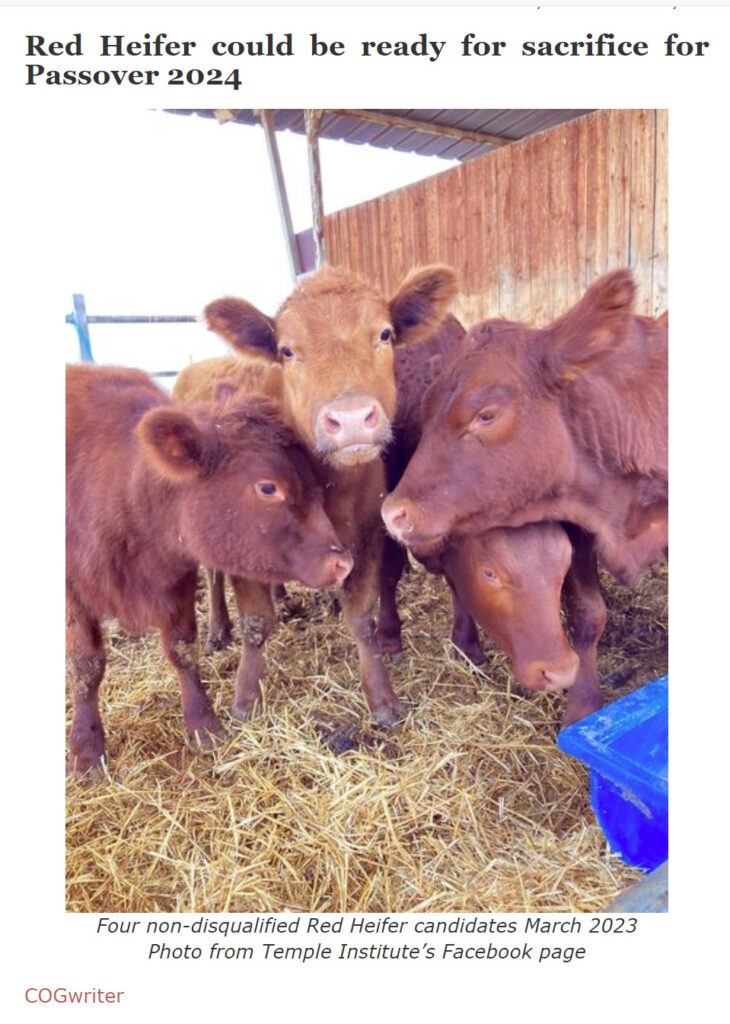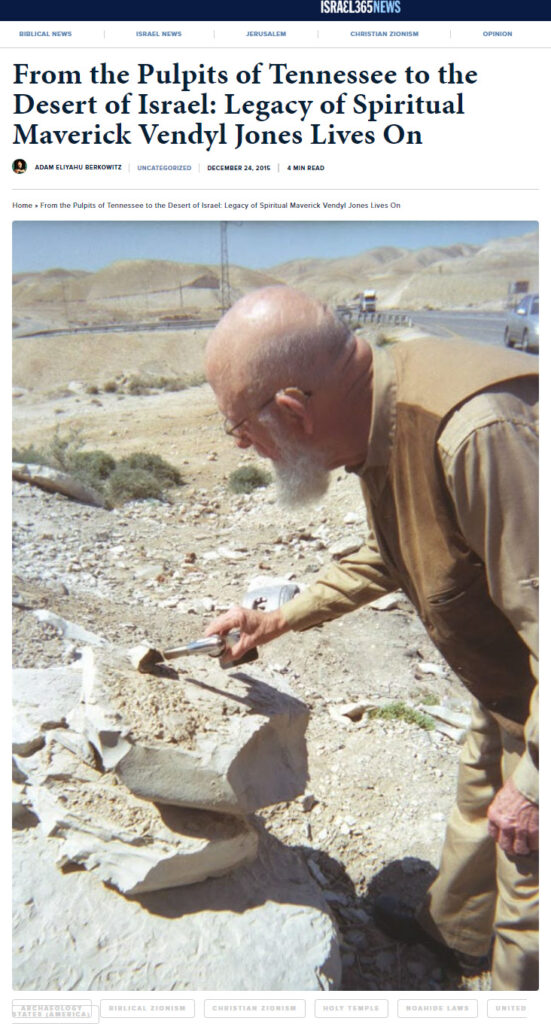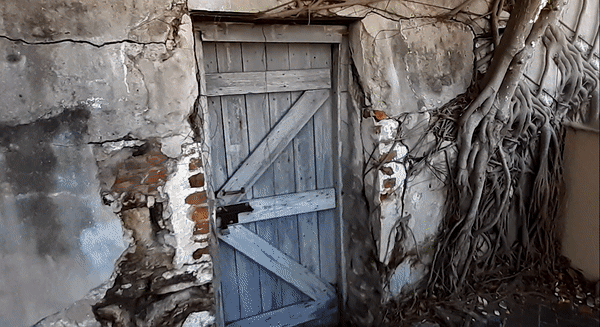Until this very morning I did not know that Stephen Spielberg’s character Indiana Jones may have been based on a real person named Vendyl Jones, nor that one actual quest this man was pursuing was to find the ashes of the last-sacrificed red heifer, in addition to the Ark of the Covenant. In response to my recent column “Should Christians support the building of Third Temple?” a longtime supporter sent me the following message based on half-century-old memories:
“About 45 years ago, Vendyl Jones (Indiana Jones) came to our SBC church. His dog was named Indiana. At that time he was searching for the ashes of the red heifer, not the Ark of the Covenant as the movie version told us. He said, and he may or may not be correct, that there have been hundreds of red heifers without spots or blemish, but they will not do. The ashes of the new red heifer must be mixed with the ashes of the previous red heifer. Kind of like the apostolic succession of the red heifer. So he was searching for the container of the ashes of long ago. Important or not I do not know. I followed his work for several decades, and they never found the ashes. And his general theology may not be accurate either. And he was successful in getting several work teams from our church over there to dig, but they found nothing.”
Sure enough, a Google search turned up this fascinating Wikipedia article that opens with this sentence: “Vendyl Miller Jones (May 29, 1930 – December 27, 2010) was an American Noahide scholar who directed archaeological searches for biblical artifacts such as the Ark of the Covenant.” A very colorful and adventurous figure with a theologically unique life’s path certain to be of interest to many WND readers, Vendyl’s life would make a great biographical film in its own right. Along that path he learned that “In 1964, the Journal of Near Eastern Studies reported the 1952 discovery of the Marble Tablets in Beirut, Lebanon. That same year the Copper Scroll was found in Cave No. 3 at Qumran, West Bank, which listed the hiding places of 64 sacred articles which included the Tabernacle and the Ark of the Covenant.”
This revelation inspired him to try to seek out these priceless treasures personally, and he spent many years doing so, moving to Israel and recruiting (as my friend testified above) American Christians to go there and dig for them, including “eight excavations at Qumran, involving over 300 volunteers.” These did recover significant artifacts. His list of accomplishments and high level Israeli allies in this work is quite impressive, but for my purposes the red heifer connection is most interesting.
“While attempting to find or grow a red heifer in order to revive the ancient temple rituals, Jones was an active member in the 2004 attempt to revive the Sanhedrin along with Rabbi Yisrael Ariel, head of The Temple Institute, and later worked with the President of the Sanhedrin Rabbi Adin Steinzaltz.”
The Temple Institute is the organization driving the Third Temple effort. My wife and I have twice visited its museum in the Hebrew Quarter of Old Jerusalem, which houses a sacrificial altar and all the implements and objects necessary for the restoration of Temple worship, fashioned to precise biblical requirements. The Sanhedrin has in fact been re-constituted and has begun issuing findings in matters of theological concern, such as the reinstitution of the counting of the Jubilees and declaration that the Hebrew year beginning in the fall of 2015 was a Jubilee year – the first recognized in Israel in roughly 2,000 years.
Per Wikipedia, “Jones also claimed to have been the subject of a movie script that was circulated in Hollywood, and which he claimed inspired the character of Indiana Jones. … According to the story, a certain Randolph Fillmore, who had been on one of Jones’s digs, wrote the first draft for ‘Raiders of the Lost Ark’; Vendyl became ‘Endy,’ then ‘Indy.’ … According to the now defunct Vendyl Jones website: ‘In 1977, a young man volunteered for one of our archaeological digs. His name was Randy Filmore. He wrote a screenplay based on Vendyl’s experiences and titled it “The Search for the Ashes of the Red Heifer.” Upon returning to the States, Randy contacted Vendyl with the news that he’d found representation for his script in Hollywood. To this day, Vendyl has not heard from Filmore. When Vendyl recounts this story to the press, they often misinterpret it as a claim by Vendyl that he and Indy are the same.'”
Vendyl stated in his book “A Door of Hope: My Search for the Treasures of the Copper Scroll” (2005): “I have never stood up and declared, ‘I am the real Indiana Jones.'” My guess, bolstered by my friend’s testimony, is that he did believe and make that claim (if not in those words) – which may actually be true – but backed way off after getting served with a cease and desist order by some Hollywood megafirm promising personal destruction by legal fire and brimstone if he persisted.
My friend’s comment about the need for the new red heifer ashes to be mixed with the old raises a question I have never seen discussed, and I don’t know of any biblical reference to it. That would be a matter for the Sanhedrin, I suppose. But they and the Temple Institute are pressing ahead with preparations for the sacrifice.
Since I last published on the red heifer theme, I’ve learned three important new facts (from this article):
First, that a massive altar for the red heifer sacrifice has already been built (see photo in the article), indicating to me they are dead serious about completing the ritual ASAP.
Second, that the annual Hebrew Sabbath of the Red Heifer falls on March 29 of this year – just a few days from now as I write this (though there is no published plan that I know of, nor specific biblical mandate, to conduct the sacrifice on that day).
Third, that “bringing red cows” to the Holy Land was named by Hamas spokesman Abu Ubaida as one of the motives for the Oct. 7 massacre in a speech marking the 100th day of the war in Gaza.
I’ve always been a fan of the Indiana Jones movies, but the real life action/adventure unfolding before us regarding the red heifer and the potential for Third Temple is more exciting than anything Spielberg put on film.
Postscript: In response to several reader comments, I want to be clear that I do not insist that the Temple must be rebuilt for the prophecy of Matthew 24:15 to be fulfilled. A temple is not mentioned by name, just “the holy place.” I am on record for years that Ezra 3:6 shows unambiguously that an altar can serve as a holy place when the Temple has not yet been reconstructed. That said, I expect to see a Third Temple physically erected in Israel even though it’s not technically necessary.
Post-postscript: After I had completed this article, I received a link to another interesting article about Vendyl Jones here.





